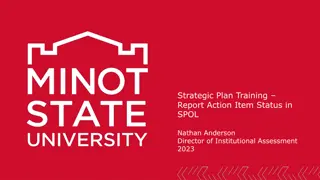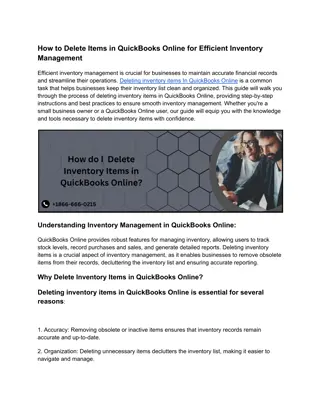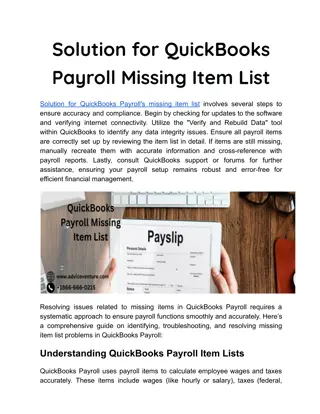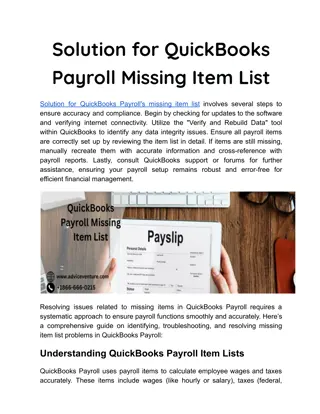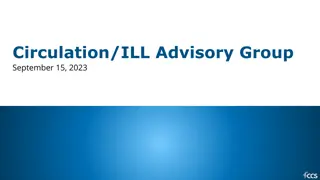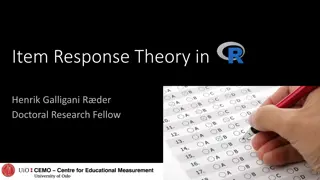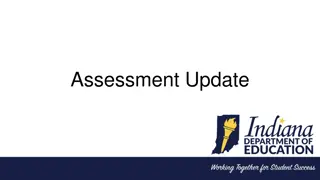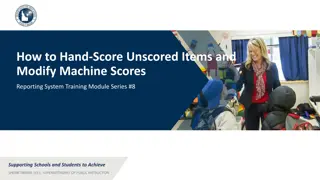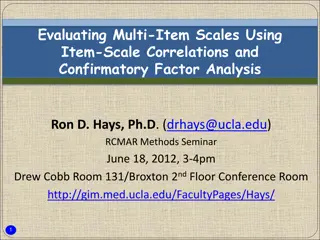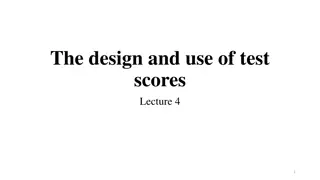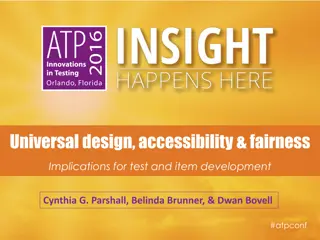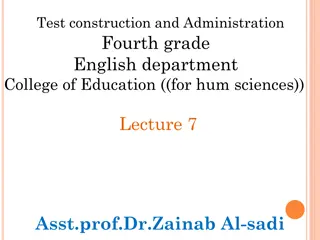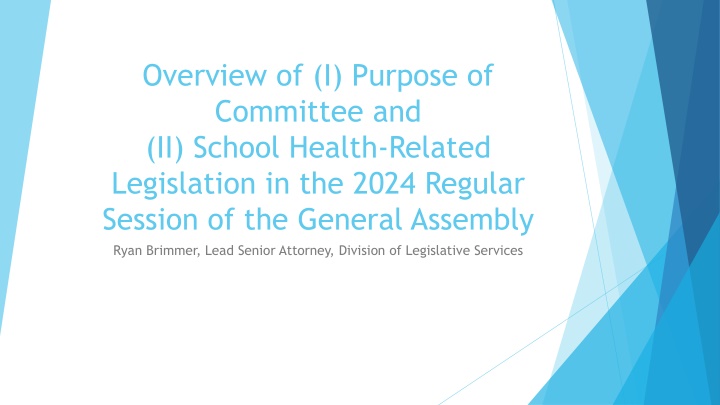
School Health Legislation Highlights in 2024 Session
The overview outlines the purpose of a committee reviewing health-related legislation for schools in the 2024 General Assembly session. It discusses categories of legislation, such as student instruction and mental health initiatives, with specific bills requiring severe allergic reaction training, opioid education materials, and fentanyl awareness initiatives.
Uploaded on | 0 Views
Download Presentation

Please find below an Image/Link to download the presentation.
The content on the website is provided AS IS for your information and personal use only. It may not be sold, licensed, or shared on other websites without obtaining consent from the author. If you encounter any issues during the download, it is possible that the publisher has removed the file from their server.
You are allowed to download the files provided on this website for personal or commercial use, subject to the condition that they are used lawfully. All files are the property of their respective owners.
The content on the website is provided AS IS for your information and personal use only. It may not be sold, licensed, or shared on other websites without obtaining consent from the author.
E N D
Presentation Transcript
Overview of (I) Purpose of Committee and (II) School Health-Related Legislation in the 2024 Regular Session of the General Assembly Ryan Brimmer, Lead Senior Attorney, Division of Legislative Services
I. Overview of Purpose of Committee Purpose: Review and provide advice to the General Assembly and other policy makers regarding proposals that require local school boards to offer certain health services in a school setting.
II. Overview of School-Health Related Legislation in 2024 Categories: Student instruction Teacher training Student nutrition Medication administration Student physical examinations Misc. plans, policies, and guidelines Broad themes: Mental health Opioids
Student instruction (passed): HB 121 (Sullivan): Requires the Board of Education to include in the Standards of Learning for health education for grade nine and grade 10 an in- person or online severe allergic reaction awareness training that includes certain topics enumerated in the bill.
Student instruction (passed): HB 134 (Convirs-Fowler): Requires the Department of Education, in consultation with such stakeholders and experts as it deems necessary or appropriate, to develop and submit to the Chairs of the House Committee on Education and the Senate Committee on Education and Health by November 1, 2024, (i) age-appropriate and evidence-based education materials concerning the risks to health and safety that are posed by opioids and (ii) guidelines for school boards for incorporating such education materials into instructional programs for students enrolled in the local school division.
Student instruction (passed): HB 1473 (Clark): Requires the Department of Education to develop, in collaboration with the Department of Health, a fentanyl education and awareness informational one-sheet designed to promote awareness of the dangers associated with and the prevalence of fentanyl and provide essential information on fentanyl overdose prevention and preparedness among high school-age students. The bill requires the Department of Education to make available to each school board and post in a publicly accessible location on its website such informational one-sheet and to annually review and update such informational one-sheet in collaboration with the Department of Health to ensure its currency and accuracy. The bill requires each public high school or secondary school that includes grades nine through 12 to annually distribute such informational one-sheet to each student in grades nine through 12 within the first two weeks of the school year.
Student instruction (passed): HB 603 (Price): Requires health instruction provided to elementary and secondary school students to include certain topics relating to mental health that are enumerated in the bill, including (i) general themes of social and emotional learning, including self-awareness, self-management, responsible decision making, relationship skills, and social awareness; (ii) signs and symptoms of common mental health challenges; and (iii) mental health wellness and healthy strategies for coping with stress and negative feelings, including conflict resolution skills.
Student instruction (passed): HB 719 (Reaser)/SB 379 (Boysko): Requires the Board of Education to develop Standards of Learning and curriculum guidelines for research-based hazing prevention instruction to be provided as a part of physical or health education instruction provided to students in grade nine or 10. The bill requires such hazing prevention instruction to include age-appropriate, extensive, and current education about hazing, including (i) examples of hazing; (ii) the dangers of hazing, including the consequences of alcohol intoxication; and (iii) school policies and laws related to hazing, including criminal penalties and bystander intervention.
Student instruction (passed): HB 1221 (Seibold): Permits each school board to provide a program of instruction on menstrual education as a part of any health education instruction offered at such grade level in grades four through eight as the school board deems appropriate.
Teacher training (failed vetoed): HB 224 (Henson): Would have required each teacher and other relevant personnel, as determined by the applicable school board, employed on a full- time basis to complete mental health awareness training that addresses the needs of youth populations that are at a high risk of experiencing mental health challenges and disorders in accordance with evidence-based best practices developed by the American Psychological Association. Current law requires such teachers and personnel to complete mental health awareness training but does not contain any requirements relating to the specific topics such training must address.
Student nutrition (failed): HB 686 (Bennett-Parker): Would have provided that each school board shall require each public elementary and secondary school in the local school division to participate in the federal National School Lunch Program and the federal School Breakfast Program administered by the U.S. Department of Agriculture or in the Community Eligibility Provision (CEP) as provided in relevant law, if applicable, and to make lunch and breakfast available to any student who requests such a meal at no cost to the student, unless the student's parent has provided written permission to the school board to withhold such a meal from the student. The bill also would have required the Department of Education to reimburse each public elementary and secondary school for each school breakfast and lunch served to a student, with a maximum of one breakfast and one lunch per student per school day, and provided the formula for determining the state reimbursement rate for such meals.
Student nutrition (passed): SB 283 (Roem): Requires the Superintendent of Public Instruction, in coordination with the Secretary of Education, to convene a stakeholder work group to study the estimated impact of offering free school meals to students statewide, identify options for reducing or eliminating student and school meal debt, and make recommendations on options for leveraging other programs funded at the state and federal levels for the provision of student school meals. The bill requires the work group to report its findings and recommendations to the Joint Subcommittee on Elementary and Secondary Education Funding by November 1, 2024.
Medication administration (passed): HB 732 (Sewell)/SB 726 (Pillion): Requires each local school board to develop and implement, by the start of the 2025-2026 school year, plans, policies, and procedures for (i) providing at each public secondary school that includes grades nine through 12 a program of instruction on opioid overdose prevention and reversal and for encouraging each student to complete such program of instruction prior to graduation; (ii) the procurement, placement, and maintenance in each public elementary and secondary school of a supply of opioid antagonists in an amount equivalent to at least two unexpired doses for the purposes of opioid overdose reversal; and (iii) the possession and administration of an opioid antagonist by any employee of the school board who is authorized by a prescriber and trained in the administration of an opioid antagonist.
Medication administration (passed): HB 1039 (Bennett-Parker): Permits, with certain conditions and restrictions, (i) any local school board to adopt and implement policies for the possession and administration of undesignated nasal or injectable glucagon in each public elementary or secondary school in the local school division; (ii) any public elementary or secondary school to maintain a supply of nasal or injectable glucagon in any secure location that is immediately accessible to any school nurse or other employee trained in the administration of nasal and injectable glucagon prescribed to the school by a prescriber; and (iii) any school nurse or other authorized employee who is trained in the administration of nasal and injectable glucagon to administer nasal or injectable glucagon from undesignated inventory with parental consent and if the student's prescribed glucagon is not available on school grounds or has expired.
Student physical examinations (passed): HB 1279 (Hayes): Requires the Department of Health, in conjunction with the Department of Education, to examine the Department of Health's COMMONWEALTH OF VIRGINIA SCHOOL HEALTH ENTRANCE FORM: Health Information Form/Comprehensive Physical Examination Report/Certification of Immunization and make such changes as they deem necessary to streamline such form, make it available in both digital and print formats, and make it more user-friendly for families, physicians, and other health care professionals while continuing to gather all of the information that is necessary to comply with relevant state laws relating to student health and immunization and school attendance.
Student physical examinations (continued to 2025): SB 395 (Pekarsky): Would have provided that no public elementary or secondary school student is permitted to be a participant on or try out for any school athletic team or squad with a predetermined roster, regular practices, and scheduled competitions with other elementary or secondary schools unless such student has submitted to the school principal a signed report from a licensed physician, licensed advanced practice registered nurse, or licensed physician assistant acting under the supervision of a licensed physician attesting that such student has, within the preceding 365 days, received both a physical examination and a mental health assessment. Current law only requires that the signed report attest that any such student has received a physical examination within the preceding 12 months.
Misc. plans, policies, and guidelines (passed): SB 498 (Carroll Foy): Requires the Board of Education to establish guidelines for school-connected overdose response and parental notification policies to aid local school boards in the implementation of such policies. The bill requires such guidelines to include (i) a model action plan for each school board to follow in responding to any school-connected overdose, including communicating and coordinating with the Department of Education and the applicable law-enforcement liaison or the local law-enforcement agency that employs such school division's school resources officers, and (ii) criteria for issuing parental notification to ensure sensitivity to the privacy interests of affected individuals and compliance with any applicable law, rules, or regulations relating to the disclosure and protection of a minor's personal, confidential, or otherwise sensitive information.
Misc. plans, policies, and guidelines (failed): HB 936 (LeVere Bolling): Establishes several enumerated requirements for school boards to ensure indoor air quality in each public school building in the local school division, including identifying a designated individual to oversee the establishment of and adherence to a preventive maintenance schedule for the HVAC system in each such building and the implementation of the use of general or local exhaust ventilation in areas of each such building where housekeeping and maintenance activities involve the use of equipment or products that could reasonably be expected to result in hazardous chemical or particulate exposures, among other things.
Misc. plans, policies, and guidelines (failed): SB 181 (Rouse): Would have required each public elementary or secondary school to develop a cardiac emergency response plan (CERP) that addresses the appropriate use of school personnel to respond to incidents involving an individual who is experiencing sudden cardiac arrest or a similar life- threatening emergency while on school grounds and, in the event that such school has an athletic department or organized athletic program, while attending or participating in an athletic practice or event.


